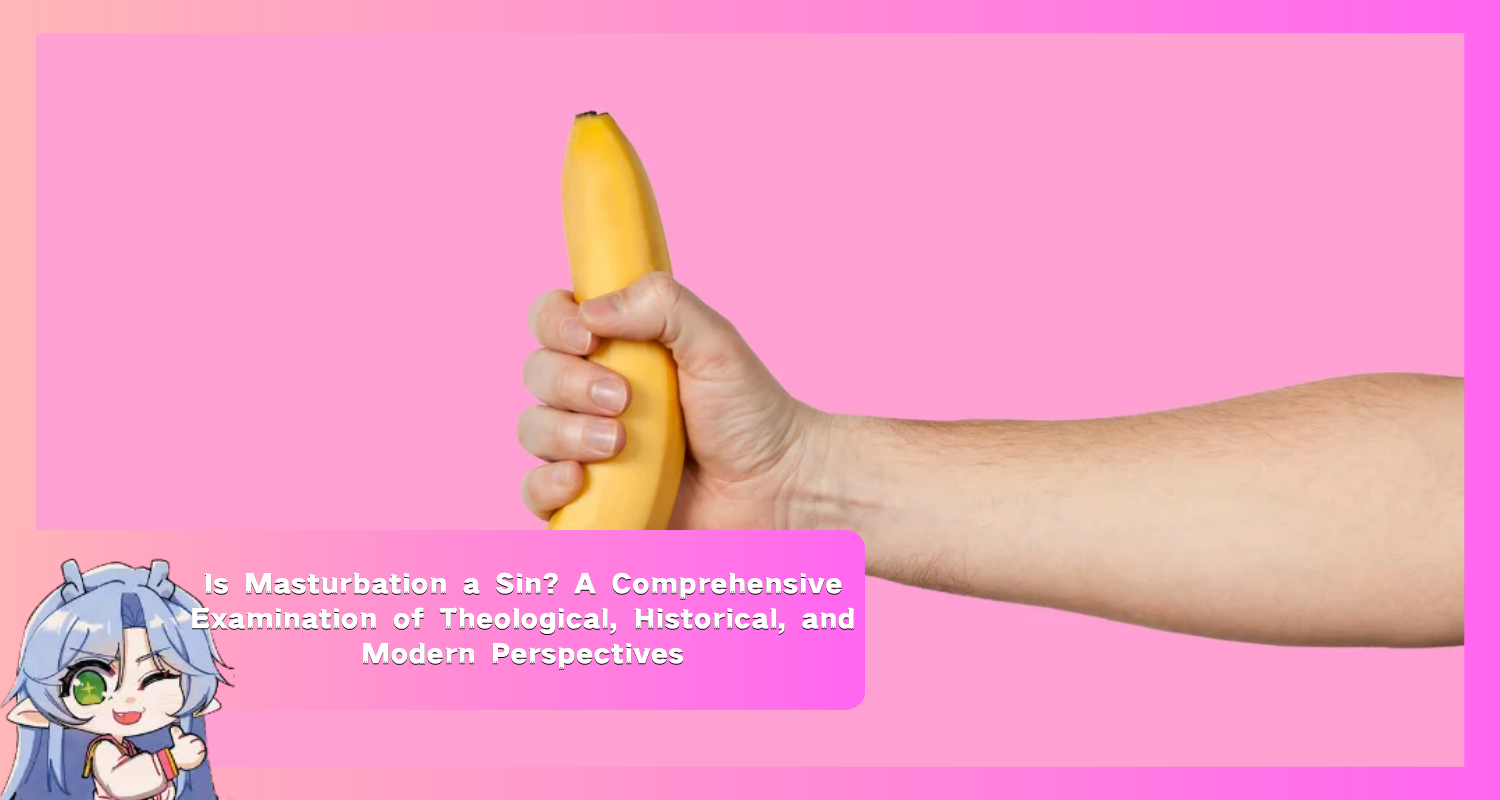Is Masturbation a Sin? A Comprehensive Examination of Theological, Historical, and Modern Perspectives
Table of Contents
Introduction: The Enduring Question of a Private Act
The Verdict of Faith: Sin, Purity, and Self-Pleasure in Abrahamic Religions
The Secular Sin: How Masturbation Became a Medical Disease
The Modern Re-evaluation: Scientific and Psychological Perspectives
Practical Application: Navigating Solo and Partnered Sexuality
Frequently Asked Questions (FAQ)
Introduction: The Enduring Question of a Private Act

Asking "is masturbation a sin?" is not a simple question. It is a deep and often stressful one that people have asked for centuries. If you are asking this, you are one of many people trying to balance natural human urges with the moral rules of religion and society. This search for an answer shows a basic conflict between a private, physical act and the strong public stories about it. The fact that this question keeps coming up shows that the real problem is often not the act itself, but the guilt and confusion caused by centuries of negative views. This article will not give you a simple "yes" or "no." Instead, it will look at the topic from all sides. We will explore religious beliefs, historical views, and modern science to give you a full picture, empowering you with knowledge instead of just rules.
The Verdict of Faith: Sin, Purity, and Self-Pleasure in Abrahamic Religions
For many people, the idea of sin comes from their religion. The major Abrahamic faiths—Christianity, Judaism, and Islam—have developed complicated and often different views on masturbation. When you look closely, you see that these views are usually based on interpreting general ideas, not on direct commands from God. A lot of the focus has been on controlling men's ability to have children.
Christian Interpretations: Navigating Scripture's Silence
A key point in the Christian debate is that the Bible never directly mentions masturbation, so it doesn't forbid or approve of it. Because the Bible is silent on this, Christians have many different opinions. Theologians and believers have to figure out answers by looking at general principles about lust, self-control, and the purpose of sex.

The Case of Onan: Deconstructing a Foundational Misinterpretation
The Bible story most often used to condemn masturbation is about a man named Onan in Genesis 38:9–10. In this story, Onan had a duty to have a child with his dead brother's widow, Tamar, to continue his brother's family line. Instead, Onan "spilled his semen on the ground" to avoid this responsibility. God then punished Onan with death. Many have taken this to mean that "spilling seed" is a sin. However, a closer look at the text shows that God was angry with Onan for his selfish act of rebellion and for refusing to do his duty to his family. Later, people took his name and created the word "onanism" to mean masturbation. This was a big change because it shifted the focus of the story from a social duty to a private act.
Applying Biblical Principles: Lust, the Body as a Temple, and Self-Control
Without a direct rule against it, Christian arguments against masturbation are based on three main ideas:
·Lust: Jesus warned against lustful thoughts in Matthew 5:27–30. The argument here is that if masturbation involves lustful daydreams or pornography, it becomes a sin because of its connection to lust.
·Self-Control: Bible verses that talk about discipline, like 1 Corinthians 6:12 ("I will not be mastered by anything"), are used to argue that masturbation as a habit shows a lack of spiritual control and can become a habit that controls you.
·The Purpose of Sex: Based on 1 Corinthians 7, some theologians argue that God created sex to be a selfless act of giving within a marriage. Since masturbation is a solitary and self-focused act, it is seen as moving away from God's plan for intimacy.
The Unambiguous Stance of the Catholic Catechism
While the Bible is silent, the Catholic Church has a clear position. The Catechism of the Catholic Church (CCC) in paragraph 2352 states that "masturbation is an intrinsically and gravely disordered action," meaning it is an action that is seriously and fundamentally wrong. The Church's reasoning is that the act separates sexual pleasure from its two purposes given by God: having children and uniting a couple in marriage. However, the Catechism also adds a note for pastors, saying that things like "affective immaturity, force of acquired habit, conditions of anxiety, or other psychological or social factors" can reduce or even remove a person's moral blame.
The Spectrum of Protestant Views
Protestant churches do not have a single authority like the Catholic Church, so they have a wide variety of views. Conservative evangelicals often agree with the arguments about lust and self-control, and they see the act as sinful. On the other hand, more liberal Protestant churches might see masturbation as morally neutral or acceptable. They point out that there is no direct rule against it in the Bible and focus on the importance of a healthy sexuality that doesn't exploit anyone.
Jewish Law and Lore: The Gravity of "Spilling Seed in Vain"
Although the Torah itself does not directly forbid masturbation, later writings from rabbis, especially the Talmud, are very strongly against it, particularly for men. The main problem is what's called hashchatat zera, which means "wasting seed for no reason."
Talmudic Prohibitions and Rabbinic Condemnation
The most detailed discussion is in the Babylonian Talmud (Niddah 13a-b), which gives serious warnings. Rabbi Eliezer says that a man who holds his penis to urinate is seen as if he "brings a flood to the world," connecting the act to the sins that happened before the great flood. Other rabbis in the same text compare wasting seed to worshiping idols and even to murder. The Shulchan Arukh, a major book of Jewish law, says that wasting sperm is a sin "greater than any sin in the Torah." This statement was later explained as an exaggeration meant to scare men away from the act.
Mystical Dimensions, Ritual Purity, and the Modern Shift
This rule is supported by other ideas. Leviticus 15 says that any release of semen makes a man ritually impure (tamei) until he bathes and evening comes. This applied no matter how the semen was released. Additionally, the mystical tradition of Kabbalah taught that wasted seed could create demons or would require major acts of repentance. Because of this intense focus on male seed, female masturbation was not treated as seriously, since it does not involve the "spilling of seed." In modern times, Orthodox Judaism mostly continues to follow these traditional rules. However, Conservative and Reform Judaism generally do not, as they have been influenced by the decline of mystical beliefs and the modern medical understanding of sexuality.
Islamic Jurisprudence: Between 'Haram' (Forbidden) and Necessity
In Islam, when we ask if masturbation is a sin, most scholars say it is haram (forbidden), but there are important minority opinions that see it differently.

Quranic Interpretation and the Majority View on Transgression
Most scholars, especially from the Shafi'i, Maliki, and Hanbali schools of thought, forbid masturbation. They base this on their interpretation of verses in the Quran. The main evidence comes from Surah Al-Mu'minun (23:5-7), which praises believers who "guard their chastity (i.e. private parts), except from their wives... But whoever seeks beyond that, then those are the transgressors." These scholars argue that masturbation is an act that "seeks beyond" what is allowed in marriage and is therefore a forbidden act. This idea is supported by Surah Al-Nur (24:33), which tells those who cannot afford to marry to "keep themselves chaste." This is seen as a call to be patient rather than to seek self-gratification.
Minority Opinions and the Concept of 'Makruh' (Disliked)
Some scholars, particularly in the Hanafi school, offer a more flexible view. They believe that while the act is generally forbidden, it might be allowed if it is necessary, for example, if a person is afraid they might otherwise commit a bigger sin like zina (sex outside of marriage). Some scholars say the act is not haram but makruh—which means it is disliked or discouraged, but not strictly forbidden. This range of opinions allows for different personal beliefs, from a strict ban to allowing it in certain situations.
The Secular Sin: How Masturbation Became a Medical Disease
For centuries, people mostly talked about masturbation as a religious sin. But in the 18th century, that conversation changed dramatically. The act went from being seen as a private moral problem to a public health emergency. It became a non-religious sin that people believed could harm the body and mind in this life, not just the soul in the afterlife.
From Ancient Normalcy to Pre-Modern Ambivalence
To see how big this change was, it's important to know that many ancient cultures saw masturbation as normal. There are prehistoric rock paintings that show the act. In Egyptian mythology, the god Atum was said to have created the universe by masturbating. The ancient Greeks mostly saw it as a healthy and natural alternative to other sexual activities. The philosopher Diogenes of Sinope famously masturbated in public and said, "If only it were as easy to banish hunger by rubbing my belly."

The 18th-Century 'Onania' Panic and the Medicalization of a Vice
This moral panic was given a look of scientific truth by the famous Swiss doctor Samuel-Auguste Tissot. In his 1760 book L'onanisme, Tissot argued that semen was a vital fluid that came from the brain and spinal cord. He claimed that losing it through masturbation led to a "sacrifice" of brain fluid, which caused nerve damage, physical decay, and many illnesses. This medical approach was more convincing than religious warnings because it made people fear a real threat of their bodies and minds breaking down.

The Victorian Era: Repression, Moral Panic, and Extreme "Cures"
In the 19th century, this medical and moral panic became even more intense. Victorian society, which valued self-discipline and moral purity, fully supported the campaign against masturbation. The list of supposed illnesses grew to include almost every known disease. This fear led to the creation of cruel "cures" to prevent the act. These included physical restraints, spiked rings for the penis, sewing the foreskin shut, and even removing the clitoris in women who were considered "hysterical." On a less extreme but still telling note, Dr. John Harvey Kellogg, a strong opponent of masturbation, co-invented corn flakes as part of a plain diet meant to reduce sexual urges.

The Modern Re-evaluation: Scientific and Psychological Perspectives
In the 20th century, a completely different story emerged. Modern medicine and psychology took apart the old myths that had caused fear and shame for so long. Today, scientists agree that masturbation is a normal and healthy part of human sexuality.
The Health and Wellness Case for Masturbation
Instead of causing disease, masturbation is now known to have many physical and mental health benefits. When you have an orgasm, your body releases "feel-good" hormones and brain chemicals, including dopamine, oxytocin, and endorphins. These chemicals help to fight cortisol, the body's main stress hormone.

The known benefits are many and include reducing stress, improving sleep, relieving pain (like menstrual cramps and headaches), and boosting mood, which can help prevent anxiety and depression. For men, studies suggest that ejaculating often may be linked to a lower risk of prostate cancer, possibly by clearing out potentially harmful substances from the prostate gland. For women, masturbation can lead to stronger pelvic floor muscles, a higher sex drive, and more satisfaction in sex with a partner.
|
The Historical Myth (18th-19th Century Claim) |
The Modern Scientific Consensus (20th-21st Century Evidence) |
|
Causes insanity, epilepsy, and nervous disorders. |
No link. In fact, it reduces stress and anxiety by releasing endorphins, dopamine, and oxytocin, and may help prevent depression. |
|
Leads to blindness, impotence, and physical weakness. |
False. Masturbation does not cause vision loss, erectile dysfunction, or physical decay. It can improve cardiovascular fitness as a form of light exercise. |
|
Depletes a vital life fluid, leading to premature death. |
False. Semen is continuously produced. Frequent ejaculation is linked to a lower risk of prostate cancer and is not harmful. |
|
Causes infertility or weak offspring. |
False. Masturbation does not affect fertility. For men trying to conceive, frequent ejaculation can ensure sperm are fresh and healthy. |
The Psychology of Self-Pleasure: Healthy Development, Guilt, and Compulsion
From a psychological viewpoint, masturbation is an important part of developing a healthy sexuality. It is one of the main ways people learn about their own bodies, find their erogenous zones, and understand how they get aroused—a concept sometimes called "body literacy." Knowing your own body like this is very helpful for telling a partner what you need and want, which can lead to better sexual relationships.

For most people, the only major negative side effect of masturbation is psychological: feelings of guilt and shame. These feelings don't come from the act itself but are a direct result of the religious and medical condemnations from the past. It is also important to give a balanced view and admit that for a small number of people, masturbation can become compulsive. In these situations, it is often used to self-medicate and cope with deeper problems like severe anxiety, depression, or past trauma. The problem is not the masturbation itself, but the unresolved pain it is being used to cover up.
Practical Application: Navigating Solo and Partnered Sexuality
By understanding the history and science of masturbation, we can move from ideas to real-life actions that can improve both our solo and partnered sex lives.
Beyond Solitude: The Role of Mutual Masturbation in Intimate Relationships
A common myth is that masturbation means someone is unhappy in their relationship. In truth, it can be a great way to connect with a partner. Mutual masturbation is when partners stimulate themselves or each other, with or without sex toys. This activity has many benefits. It can be a low-pressure way to be intimate when intercourse isn't wanted or possible. It is also a great way to communicate, as partners can show each other what they like. And it can be a fun, exploratory, and safe way to build closeness and trust.

Optimizing the Experience: The Best Way to Masturbate for Health and Pleasure
While masturbation is healthy, some techniques can have unwanted effects. Knowing how to approach it can increase pleasure and avoid problems.
The "Death Grip" Dilemma: How Technique Impacts Penile Sensitivity
One possible issue for men is sometimes called "death grip syndrome." This means that the penis can become less sensitive if someone masturbates with a very tight grip or uses the same exact motion over and over for a long time. The penis can get used to this intense and specific stimulation, which can make it harder to feel pleasure or reach orgasm from other, gentler types of touch, like during sex with a partner. This can lead to frustration, anxiety about performance, and stress in a relationship.
Enhancing Sensation and Avoiding Desensitization with Modern Tools

If using the same hand technique can lead to less sensitivity, how can someone enjoy solo pleasure while keeping sensation for all types of sexual experiences? The answer is to try different things and explore different kinds of stimulation. This is where a male masturbator can be a useful tool. These products are designed to give different, detailed, and realistic feelings that a hand by itself often can't create. This variety helps prevent the penis from getting used to only one type of stimulation, which is what leads to desensitization. For example, advanced masturbators like the Furry Hentai Sex Doll Nicole offer a special mix of textures and shapes, providing a rich and varied experience. This allows people to go beyond simple stroking and explore different kinds of pleasure, which can help keep or even improve penile sensitivity for a better sex life, both alone and with a partner.
Frequently Asked Questions (FAQ)
Q1: Does the Bible explicitly say masturbation is a sin? A: No, the Bible is completely silent on the topic. Christian views against it are based on interpreting general ideas like lust and self-control, not on a direct command.
Q2: Why was masturbation considered so dangerous in history? A: In the 18th century, a moral panic started, fueled by pamphlets and doctors who wrongly connected masturbation to scary diseases like insanity and blindness. This medical fear was stronger than earlier religious warnings because it threatened people's physical health in this life.
Q3: Can masturbation negatively affect my relationship with a partner? A: It can if it becomes a compulsive habit that replaces intimacy. But for most people, it's a healthy part of their sexuality. Also, mutual masturbation can actually improve communication and make a couple's bond stronger.
Q4: Is it possible to masturbate "too much"? A: Physically, there are no serious side effects. Psychologically, it's considered "too much" only if it starts to negatively affect your daily life, work, or relationships. This might be a sign that you need to deal with an underlying issue like anxiety or stress.
Q5: What are the benefits of using a male masturbator versus only my hand? A: A good quality male masturbator can offer more varied and realistic sensations. This helps avoid the risk of "death grip syndrome"—a type of desensitization from overly rough or repetitive hand techniques—which helps preserve sensitivity for a more satisfying sex life with partners.



















